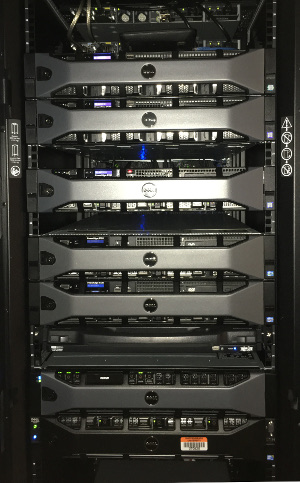 Due to the requirements of our programs, the School of Engineering maintains our own infrastructure, which includes servers, file storage, backups and more. Below is an overview of the hardware & software which provide that infrastructure.
Due to the requirements of our programs, the School of Engineering maintains our own infrastructure, which includes servers, file storage, backups and more. Below is an overview of the hardware & software which provide that infrastructure.
- Server Hardware: We currently use a mix of Dell server products. Multiple Dell PowerEdge R7515’s & R530’s provide a total of 164 physical CPU cores (328 logical cores) and 1920 GB of memory for our virtualized environment, which is used to host our infrastructure servers, (listed below,) servers which support specific classes and other special project servers in order to meet the needs of our students and faculty. A portion of our infrastructure is used to provide a secure environment in which students can build and manage their own virtual servers.
- Virtualization: Our servers are configured as two separate data-centers. One includes a cluster for management servers and critical systems, such as the File-server and computational servers, and a single server which provides management and backups for our infrastructure. The second data-center hosts our second cluster for the class and project servers which students need more access to. The data-centers utilize many of the latest VMware hypervisor technologies including vCenter Management and vMotion. The clusters also utilize vSphere’s HA technologies. This allows us to maintain a robust and flexible computer environment which can be dynamically reconfigured with little to no downtime. In addition, all ESXi hosts have read-only access to an ISO library which contains install media for over 20 Linux distros, multiple versions of Windows server and more.
- Storage: Each of the clusters in the School of Engineering’s virtualized environment utilizes a shared Dell PowerVault storage array. These units are connected to our servers using redundant 12G external SAS connections. In addition to this shared storage, the standalone server utilizes internal high capacity storage for backups. We also have additional NFS storage for the ISO library, VM replication, and VM archives. These storage solutions provide the School of Engineering with over 90 TB of disk space for our servers, backups, replicas, and student & faculty home directories. All members of the School of Engineering are also provided access to 100 TB of shared cloud storage through our Google GSuite for Education program.
- Server configuration: Virtualized on our infrastructure are the following servers which are used to provide specific resources for coursework, projects and more.
- Clipper & Sloop: These are public facing SSH servers which provides standardized environments for writing and running code. These machines can be accessed from anywhere in the continental US without the need to connect to our network using the VPN server.
- Web: The server you are currently visiting. This server hosts the School of Engineering’s website, which is used to provide informational resources, access to pre-configured software downloads, technology tutorials, and web-based utilities such as the password reset utility.
- Students: This is a web server specifically for student run websites. Each of the various clubs gets an account and space to build their own site. The server is equipped with a full LAMP stack to accommodate database driven & CMS websites such as WordPress, Drupal, Interchange and Joomla.
- FSERV: This is our primary file server for user’s home directories. This can be access from academic areas, or from anywhere once a VPN connection has been established. The path to use is simply \\fserv.engr.ship.edu\home\$USERID. More detailed directions can be found HERE.
- Gitlab: A self-hosted software repository server used to support many of our software engineering, computer engineering, and computer science courses. School of Engineering students are able to self-register using their sponsored ENGR GSuite Account. Click HERE to access the login screen.
- YouTrack: A project management server used in a number of Capstone courses. Click HERE to access the login screen.
- DB: A dedicated MySQL database server. This server can be accessed via the command line when logged into Sloop, any of our lab machines or from any computer with the client installed as long as they are either on campus or connected to the University’s VPN.
- License: A dedicated server which hosts the licensing tools used by the lab computers and students to run the following software tools: the Xilinx Vivado Suite, Solidworks, Autodesk Civil 3D, Autodesk Inventor Pro, and the JetBrains IDEs. This machine resides behind the firewall, so access can only occur from campus or while connected to the University’s VPN.
- Centralized User Accounts: To support the School of Engineering’s hybrid IT infrastructure, all lab machines rely on centralized authentication. This service is provided using Microsoft’s Active Directory. In addition to lab machines, this account can be used to access shared servers and other key resources.